
The Humane Society of Loudoun County (HSLC) is a foster-based rescue—which means we do not operate a physical shelter. Every animal we save depends on the availability of a foster home. Without fosters, we simply can’t take in animals in need. And right now, in 2025, we haven’t been able to take in a single new dog—due to a severe shortage of safe landings.
That’s where you come in.
Fostering is more than just providing a temporary place to crash. It’s a lifeline. It’s the bridge between what an animal’s life was—whether they were abandoned, neglected, surrendered, or at risk in a kill shelter—and the life they deserve in a loving, forever home.
Fostering:
- Helps animals decompress from the stress of shelters
- Increases their chances of being adopted
- Teaches them what love, safety, and routine look like
- Saves lives—literally
And here’s the best part: HSLC covers all medical care, and we’ll match you with a mentor who will support you every step of the way.
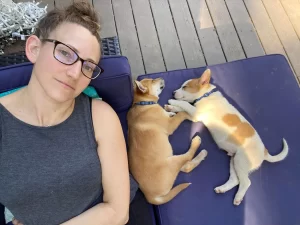
Fostering is also flexible. Whether you’re not ready for a long-term commitment or simply want to experience the joy of having a pet in your home, fostering gives you that opportunity.
Right now, we need dog fosters more than ever. Dogs who are waiting in shelters are counting on us—but we can’t say “yes” to them until someone like you says “yes” to fostering.
Please consider becoming a foster hero. You can fill out our no-obligation application here, or help us by spreading the word. Every share makes a difference.
Thank you for being part of the village it takes to save lives.
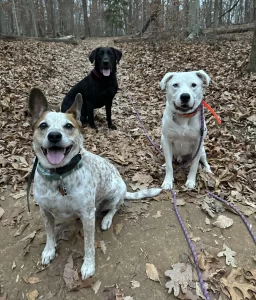
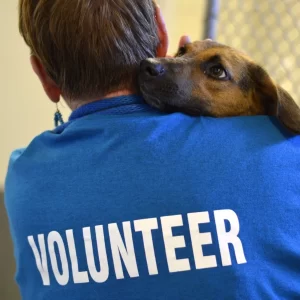
By Uchenna C. Ukeke
Volunteering is not just a simple act of kindness that benefits the community. It can also benefit you personally and professionally. And the best part? It doesn’t require wealth, fame, or perfection—just willingness. Discover how volunteering can unlock purpose and fuel growth in your life, while also enhancing the lives you touch.
Personal Growth
- Developing Emotional Intelligence: Volunteering exposes you to different perspectives and challenges, helping you develop empathy and resiliency. This increased emotional awareness improves your relationships and boosts your ability to connect and communicate with others in your life.
- Boosting Confidence: Volunteering is a powerful confidence booster. By dedicating your time and efforts to helping others, you gain a deep sense of accomplishment and self-worth. Seeing the direct impact of your work reinforces the value of your contributions, and this recognition enhances your belief in your abilities. Volunteering also helps you build new skills which can also boost your self-esteem.
- Finding Purpose and Fulfilment: By supporting causes that matter to you, like animal rescue, you become part of something greater than yourself. Volunteering provides meaning and fulfilment knowing that your efforts are making a real difference in the lives of others.
- Making Friends: Volunteering is a great way to meet new friends. As a volunteer, you’ll interact with people from diverse backgrounds and yet share a common interest. Some volunteers remain friends for life.
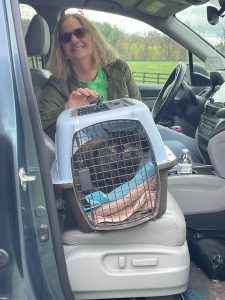
Professional Benefits
- Enhancing Your Resume/CV: Volunteering offers valuable hands-on experience that boosts your career. Whether you are managing a project or running an event, volunteering provides opportunities to refine existing skills and develop new ones, including leadership, teamwork, time management, and problem-solving. This practical experience can help fill gaps in your resume, especially if you’re changing careers, entering the workforce, or looking to climb the corporate ladder.
- Expanding Your Network: Volunteering gives you the opportunity to meet people from various professional backgrounds, whether it’s with fellow volunteers, community leaders, or like-minded professionals. These connections help expand your network and are valuable for both personal and career growth.
- Building Career Credibility: Volunteering demonstrates your commitment, passion, and reliability. It shows that you’re proactive, socially responsible, and willing to contribute beyond your job. These qualities not only benefit the causes you care about but also help your professional growth.
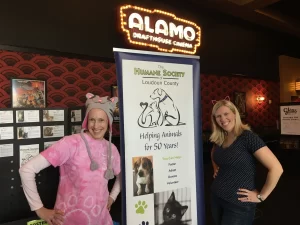
Volunteering with HSLC
Volunteering with the Humane Society of Loudoun County (HSLC) offers you the chance to make a real difference—for animals, for the community, and for yourself. HSLC provides opportunities for meaningful engagement that supports both personal development and community impact.
Ready to find your purpose and grow through giving back? Click here for HSLC’s most pressing needs. If you don’t see something of interest, please complete an application and we will work to find a role that’s right for you!

It’s hard to believe but 2025 is just around the corner. Are you thinking about adopting one or two new animal-friendly habits in the new year? If so, we’re here to help. Below are just a few resolutions to choose from:
1) Keep your pets healthy by giving them regular checkups—at least once a year and keep current with vaccinations.
2) Make dental care a priority through daily brushing and regular professional dental exams and cleanings. As many as 85% of American dogs and cats show signs of dental disease by the age of three.
3) If you haven’t already, spay and neuter your pets. Doing so helps cut down on the number of homeless animals and keeps your pets healthier.
4) Give your pets plenty of attention. Animals left at home alone become bored and lonely. They can become destructive. Provide regular play sessions, walks for dogs, and petting and/or other appropriate interaction for all animals.

5) Go easy on the treats. More than 50% of our nation’s pets are overweight or obese and face a variety of health conditions, including heart disease, diabetes, arthritis, high blood pressure, and cancer.
6) Prepare for disasters—fires, floods, storms, and the like. Have an evacuation plan that includes your animal companions, and prepare a traveling kit to have on hand always.
7) Be a voice for the voiceless and use social media to encourage friends, family and co-workers to save a life by adopting, not shopping.
8) Fostering also saves lives. HSLC provides regular trainings for those who are interested in fostering. Contact us at foster@humaneloudoun.org if you’re interested in fostering or complete a no-obligation application on our website.
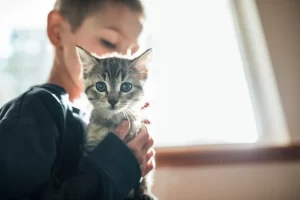
By Lauren Puckett
From the boy throwing a stick for his dog, to the girl cuddling up with her cat, there’s simply no bond like that of a child and his or her companion animal. Pets can play many roles in a child’s life, including playmate, cuddling companion, and friend. In honor of National Kids and Pets Day on April 26, let’s explore the many ways fostering or adopting a pet can benefit children.
#1 Pets improve mental health
Pets comfort us. But more than that, studies have shown they can improve our mental health. In fact, a 2015 study demonstrated that having a pet dog in the home was associated with a decreased probability of childhood anxiety.
#2 Pets teach valuable social skills
Pet ownership requires a child to love, care for, and treat an animal with respect. Playing with a cat or dog allows children to learn about reciprocity and “give and take.” Pets also teach boundaries, tolerance, and acceptance. These are all valuable skills that help a child learn how to interact with other living things.
#3 Pets impart a sense of responsibility
Children can learn responsibility by caring for a pet. For instance, they’ll learn to feed their pet, or in the case of a dog, walk it so it can take care of business. Plus, a pet needs training, which offers the opportunity to teach children about positive reinforcement.
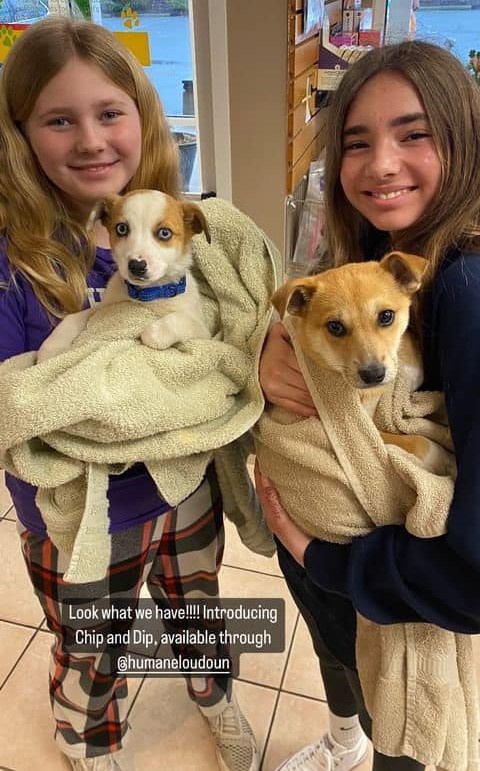
– Blaire Elizabeth Ring
#4 Pets encourage physical activity
Dogs require regular walks and outdoor time, encouraging physical activity for children. Even cats may enjoy a spirited romp about the house with their favorite child.
#5 Pets teach us about loss
As difficult as losing a beloved pet may be, this is a valuable teaching opportunity. It may be a child’s first experience with death, and they can learn useful coping skills for the future. Fostering a pet can also provide this lesson in a gentler way, as children say goodbye to a foster pet when it moves on to its forever home.
To introduce a cat or dog into your family, apply to foster or adopt an animal today.
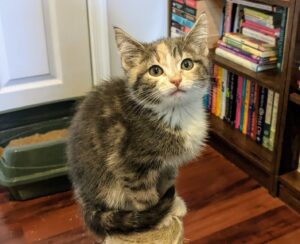
By Heather Nokes
“Kitten season” refers to the period from early spring to late fall when most kittens are born. This phenomenon is mostly due to warmer weather allowing stray or outdoor cats to venture out and begin procreating. Female cats become sexually mature as young as five months of age. In addition, because the gestation period for cats is only about two months long, they can have several litters in one year!
As kitten season ramps up, local shelters and rescues, like the Humane Society of Loudoun County (HSLC), are in dire need of kitten and cat fosters.
Why you should foster

Andi, pictured with little Ramone, has fostered over 130 cats and counting!
Fostering kittens is a rewarding experience. As a foster, you save lives while enjoying all the adorable antics that make kittens irresistible. One of HSLC’s expert kitten fosters, Andi, has been fostering cats and kittens—over 130 in total—with her husband since 2012! She had this to say about her fostering experience:
“The best part [about fostering] is being able to watch them go from sickly to healthy or from angry/scared, hissy-spitties to lap-loving cuddlebugs.”
What to know before fostering
Andi states that while kitten fostering is fun, it can also be a lot of work. You must watch the little souls closely to ensure they stay safe. If something seems odd, do not be afraid to ask questions (HSLC has an awesome foster coordinator who can help!) Be sure to love them unconditionally, and be happy to see them go to great homes.
What you need to foster
Kittens should be isolated from other pets in the home until vetted and given a clean bill of health. This is why setting up a “home base” for them is important. If they are young, a large dog crate will work; if older, an entire room would be a better fit.
Your home base should consist of:
- Clean, fresh bedding that is easy to change and wash.
- Soft surfaces that are not too high up, nothing that a kitten could get stuck in (trash can, boxes).
- A shallow litter box with a small amount of non-clumping litter.
- Shallow water and food dishes that are easy to clean.
- A healthy and safe environment for their foster kittens; any cleaning products should be removed from the kitten foster room.
- Small, soft toys that are not easily ingested or torn apart.
Kitten Veterinary care
The Humane Society of Loudoun County will pay for the veterinary care of its kittens. The first couple of vet visits often include deworming and/or flea treatment. If the kittens are healthy enough, vaccines and FeLV/FIV tests may be conducted. HSLC also spays/neuters around 4 months of age. More complicated reasons for a vet visit include diarrhea, dehydration and upper respiratory infections. For these conditions, medications may be sent home with the foster to give the kitten regularly. A healthy kitten is a happy kitten!
Saying goodbye
Saying goodbye may be the hardest part of fostering. It is important to remember that this is why you fostered, for a happy, healthy kitten to find a forever home!
Interested in giving cat or kitten fostering a try? Complete a no-obligation application today!
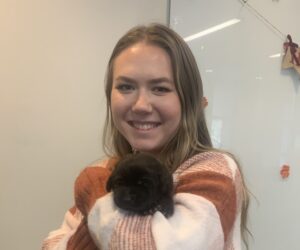
By Lauren Puckett
Did you know that performing an act of kindness actually ignites a chemical response in your brain? That’s the positive feeling you get when you do something for someone else, and it’s been coined the “helper’s high.” Beyond the momentary euphoria you enjoy, greater health and increased longevity have also been associated with this psychological state.
Here are four ways you can do a good deed (or two!) for the Humane Society of Loudoun County (HSLC) and get your own helper’s high in the new year!
DONATE
At HSLC, we are not funded by any county, state, or federal organizations. Our work is only made possible because of donors like you. Your tax-deductible donations make things like this possible:
- $20 provides two pet food kits for families in need, or two community cats enough kibble for a month
- $50 vaccinates an animal for rabies or provides five pet food kits for families in need
- $75 covers a sick exam for a foster animal
- $200 provides 20 pet food kits for families in need
- $1,000 covers the average medical cost for a foster animal (in 2022).
In addition to providing financial support, you can donate an item or two from our various wish lists. In-kind donations from these lists help to lower our operating costs, freeing up funds to save more animals.
Dig Deeper
For more information, read “When you donate, where does your money go?”
VOLUNTEER
As a volunteer-based organization with no paid staff, HSLC relies on volunteers to carry out our life-saving mission. We need many folks focused on animal care, of course, but we also need volunteers to cover the business side of the organization: finance, technology, fundraising, marketing, events and administration. Our immediate needs include fosters and volunteers to support our expanding dog foster program.
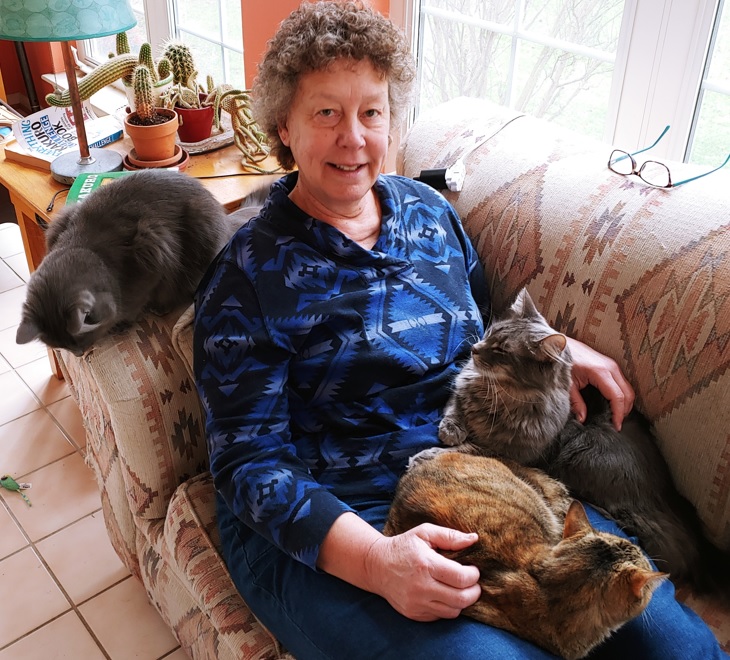
FOSTER
As a foster-based organization, we do not have a physical shelter. We can only save animals when we have a foster home to place them in. Foster families provide a healthy and safe environment for the animal. Fostering increases the animal’s chances of being adopted and helps them overcome the stress of being abandoned in a shelter. When you open your heart and home to an animal in need, you are giving them a second chance at life. Types of fostering include:
- Regular fostering
- Vacation fostering
- Emergency fostering
- Short-term fostering
- Special needs fostering
To become a foster, please complete an online application.
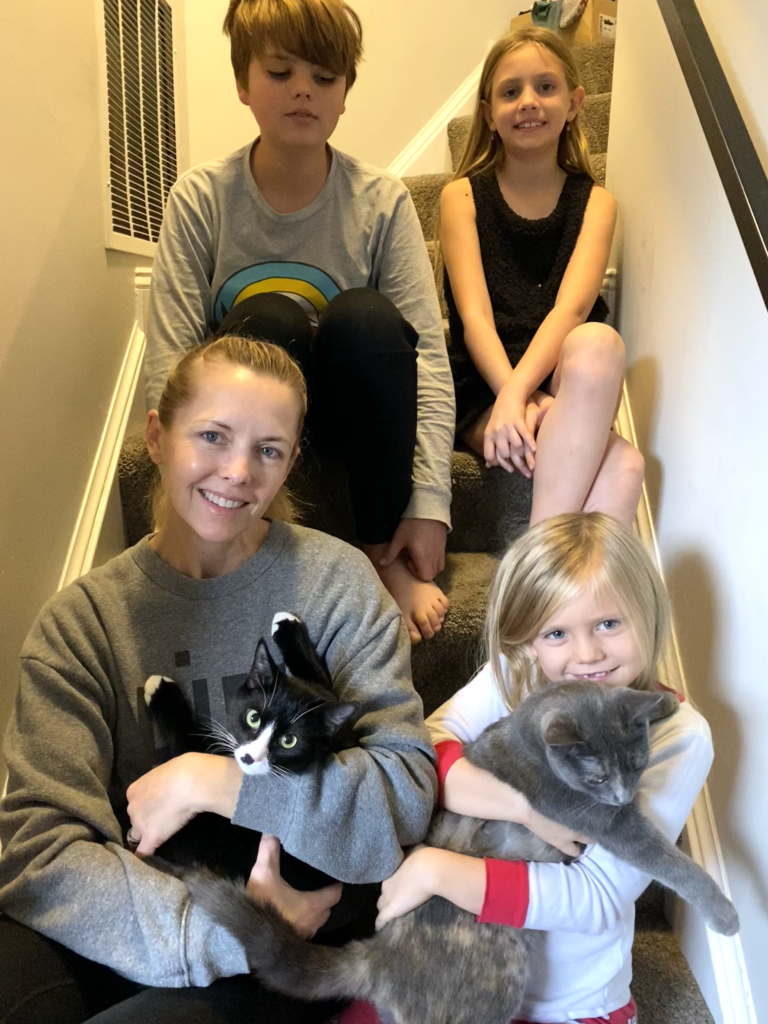
ADOPT
Each year, shelters and rescue groups take in millions of cats and dogs nationwide. “Moving” and “landlord issues” are the top reasons people give up their pets. This means organizations like HSLC have dozens of animals in their care who are anxiously waiting to meet their forever families. We hope that HSLC will be your first choice when choosing a companion animal. All pets adopted through HSLC come with the following benefits:
- Spaying or neutering at the appropriate age (even if it’s after adoption)
- Current on their vaccinations
- Microchipping
- A lifetime of post-adoption support
- Information about the animal’s behavior in a foster home environment
If you are interested in adopting, be sure to check out our available animals!

By Hannah Feeley
I recently had the pleasure of speaking with three fosters for the Humane Society of Loudoun County (HSLC). They each shared their stories and advice for new foster parents.
Meet Tyler
Tyler and his roommate, Katie, started fostering during the pandemic and have fostered 14 cats thus far with HSLC. They initially started fostering to cope with COVID-19 pandemic isolation and the emotional toll but continue to foster because it’s meaningful and fun.
Tyler mentioned the potential financial toll of fostering. Although HSLC covers all vet care expenses, it relies on the community to donate food and supplies. Otherwise, the fosters cover these costs which can add up. But Tyler and Katie have felt that the costs are worth it.
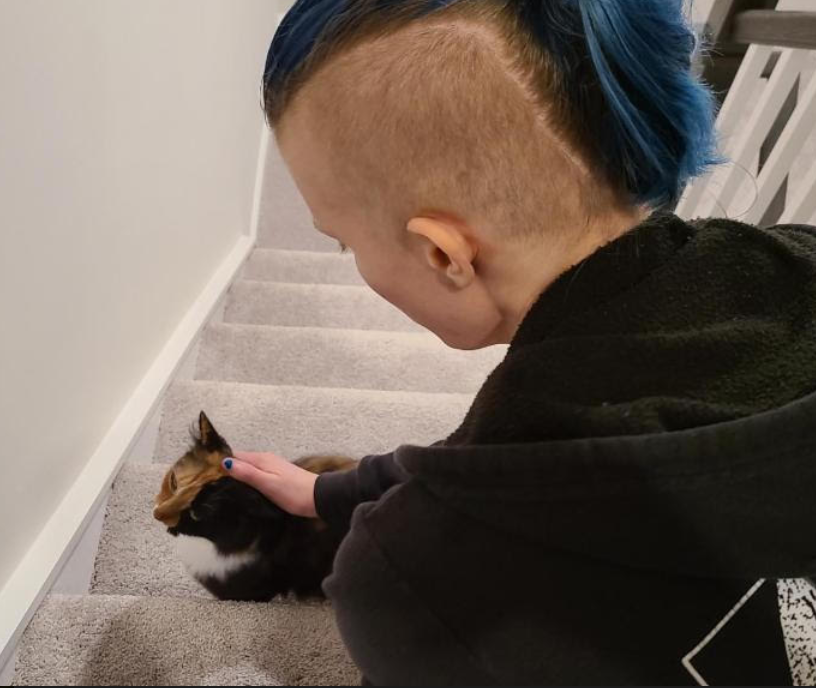
Despite both working full-time, Tyler and Katie still find time to play with and socialize the cats to get them ready for their forever homes. Katie, for instance, sets aside arts and crafts time with the cats.
Tyler recommends that new foster parents reach out to their animal rescue for advice. He highlighted that our HSLC family has given him great guidance with each animal.
Meet Jamie
Jamie and her two daughters recently became short-term fosters for HSLC. She is a homeschool parent, with two senior dogs.
Jamie was volunteering for HSLC as a cat condo caretaker at a local pet store. When the cats in the condos needed a break, her kids encouraged her to take the cats home. Both Jamie and her kids noted the incredible feeling of letting the cats decompress for a few days. Plus, they found the experience to be really fun.
Jamie emphasized that cats do not need a lot of space; whatever room you can provide may actually be more than they’re used to. She appreciates the flexibility of short-term fostering as it allows her to help the animals without making a lengthier commitment.
With the holiday season upon us, HSLC is currently in need of short-term and vacation fosters. So, if you’re considering fostering, this would be the perfect time to give it a try.
Meet Carol
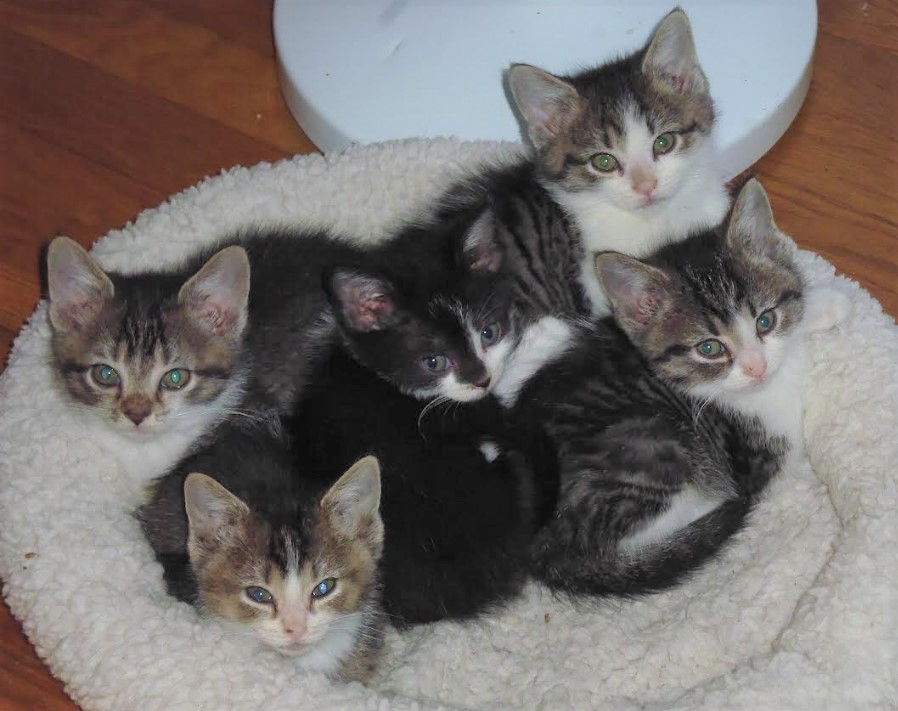
Carol is retired and has fostered cats with HSLC since 2018. Carol was initially introduced to fostering by a friend and hasn’t looked back since.
In explaining to me why she fosters, the joy in Carol’s voice was evident. – she does it because it’s enjoyable. Carol has also made (human) friends by fostering. Each time a foster cat is adopted, she makes a new friend with the adopter who sends updates about the cat’s wellbeing.
As a long-term foster parent who often takes in mistreated animals, Carol’s advice for new fosters is short and sweet: be patient. Spend time with the animals but have the patience to allow them to come out of their shells on their own.
Some people fear they won’t be able to give up the foster animals when the time comes. But Carol’s mindset is different: the more animals she can foster, the more animals she can help find homes. It’s a beautiful process and Carol is enthusiastic about her next foster.
If you’re interested in becoming a short or longer term foster, please contact us at foster@humaneloudoun.org or complete a no-obligation online application.

By Kathleen Silver
According to the SPCA, senior dogs are the hardest to get adopted. They spend four times longer in a shelter waiting for adoption versus younger dogs. For cats, kittens are adopted 82% of the time, but once a cat reaches 18 months old, it only has a 60% chance of being adopted.
Each animal, regardless of their age, should know what it feels like to be loved. Senior animals are wise, laid back, lovable, and appreciative of their caretakers. You may think you need a certain disposition to take on a senior pet, but people from all walks of life can be great candidates to foster or adopt an older companion animal. As November is National Adopt a Senior Pet month, we’ve reached out to a few folks to learn what it takes to care for a senior pet.
Fostering a Senior Pet
When Carol and Matt wanted to add a cat to their household, they were introduced to Erin. After the Herndon couple got to know her, they recognized Erin’s personality as easy-going, and boy, was she sweet! Erin remained a foster with Carol and Matt until her last days.
Erin didn’t hear very well, suffered from asthma–which required daily medications–and numerous other health issues. Carol said that administering the medications was their main challenge. But, once they had a routine for the medicines, it became a normal part of running their household.
As with any foster parents with the Humane Society of Loudoun County, Carol and Matt had a support system around them. The volunteers on HSLC’s Animal Care team were always responsive when they needed help. In addition, their vet at Loudoun Cat Care was available on short notice to lend an ear or to get Erin in for a check-up. Carol and Matt are grateful to everyone, including those who donate in support of HSLC’s foster program, for helping them give Erin the care she deserved.
Carol and Matt feel they are the same as any pet owner. They wanted their own senior kitty, Little Guy, to have a companion. Although she had some challenges, Carol and Matt relished the love Erin gave to them and did not view the support she needed as an inconvenience. Matt remembers fondly the times when Erin would make a cozy, warm nest in his lap.
Adopting Into a Big Family
Scarlett Phillips adopted Margo the cat from HSLC in early 2020 after she saw a post for her on the NovaCats Facebook page. At 14 years old, Margo was surrendered to a Maryland shelter due to the previous owner’s cat allergies. She was blind, had high blood pressure and arthritis. Scarlett looked at Margo’s photo, thought of her busy household with foster children, dogs, and cats, and said to herself: Margo will love it here, and we’ll all love Margo!
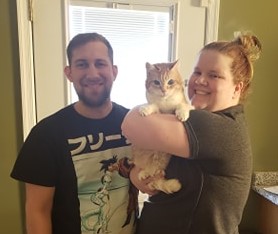
In certain ways, Margo reminded Scarlett of her dear grandmother. She loved food, had a hard time seeing, was tiny and walked stiffly. Plus, she had this funny meow that melted everyone’s hearts. Scarlett knew she needed to give Margo a chance to be settled and to live out her golden years surrounded by love, no matter how much time she had left. Scarlett and her husband believe that taking in senior pets is one of the “best things anyone can do.”
Who Should Adopt a Senior?
What is the best personality type to care for a senior pet? The answer is there isn’t one. Rather, it’s about an individual’s commitment to care for the animal. Senior pets come into a home with different challenges and rewards. But, those who take in older animals have come away with a feeling of warmth and reward like no other. As Scarlett Phillips says, “Open your heart, take a chance, and life can be good.”
Visit the HSLC website to learn about adopting or fostering a senior companion animal.

by Heather Nokes
Have you ever been to a shelter or looked at adoptable pets online, and most of them seem older? Distinguished grey faces. Lovely cloudy eyes. Unfortunately designated retirement homes for these pets are rare, so these animals need a loving home to live out the rest of their golden years.
What do we mean by “senior?”
Dogs are considered senior between the ages of 7 and 11, depending on size; while cats are considered senior at the age of 10. It is often at this time that they begin showing age-related changes: loss of vision, loss of hearing, weight gain, loss of energy, and/or arthritis and other joint problems. These changes are common reasons for senior pets to be surrendered to rescues and shelters. While these ailments might seem daunting, most of them are easily treated with regular veterinary care and medications. Love and patience also help!
What you see is what you get!
When first adopting a pet, it is most likely that you will want to get to know them. With senior pets, they have an established personality and, as AdoptaSeniorPet.org says, what you see is what you get with a senior pet! In comparison to a puppy or kitten, you do not need to wait months for their personality to blossom. It is also more likely that senior pets have experience with people, just as a seasoned pet owner does with animals. They know what they like just as you do. Again, what you see is what you get!
Senior pets also tend to be more loyal. They are grateful to be around people, to have toys, and to be fed. It is not hard to please them. They tend to be more relaxed than a young pet; napping and eating all day is enough for them to be happy. Unlike puppies and kittens, senior pets do not demand constant attention. They don’t need to play as often, and they do not need as much training!
Save a life!
Possibly the best reason to adopt a senior pet is the fact that you are saving a life. Many senior pets in rescues and shelters don’t find a home due to the fact that they are not as outgoing and active as younger animals. They just don’t “stand out.” This also means that they tend to be euthanized if health issues arise or if space in the shelter is needed. By adopting a senior pet, you are quite literally saving a life while making your life more fulfilling in return. Be a hero and adopt a senior pet!
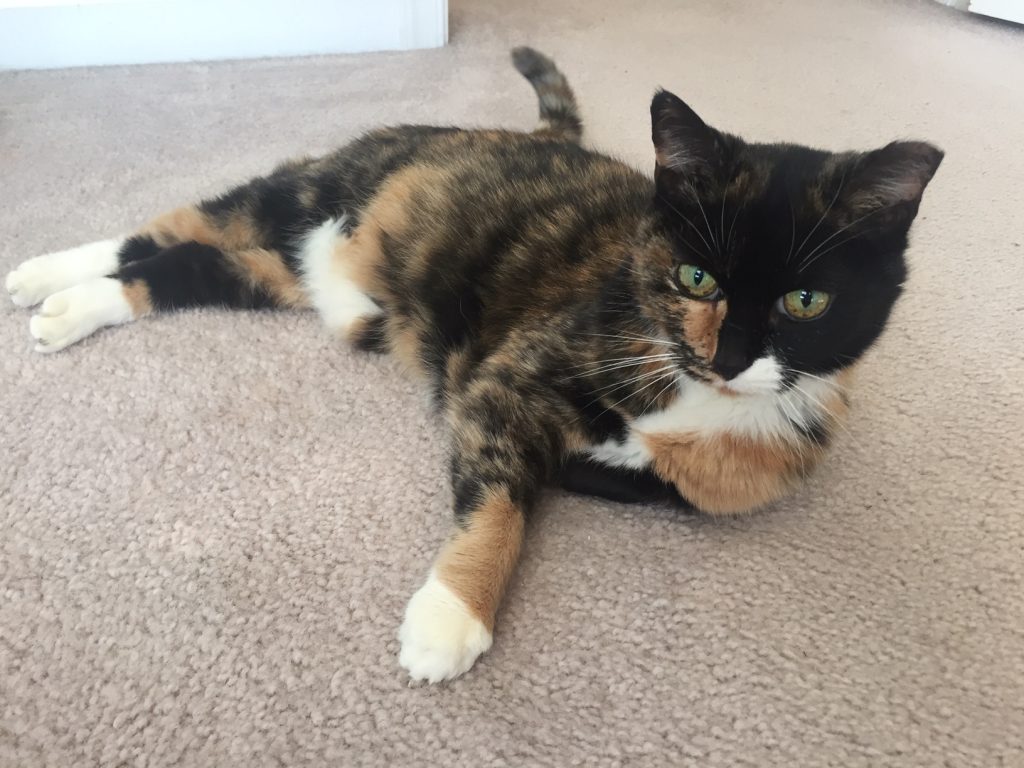
Despite a record number of adoptions this year, there are still many senior pets–like Lily pictured here–who find themselves without homes at rescues and in shelters across the U.S. Find our available animals here. Keep in mind that animals are added periodically so always check back!

Studies have shown that cat owners may experience better mental health than individuals without pets. Cats are great stress reducers. Just 15 to 30 minutes of quality time with a cat can calm your nerves and boost your mood. When you spend time with a cat, your production of serotonin (a chemical that boosts feelings of well-being) goes up, and your cortisol levels (a buildup from stress) go down. Adults and children alike report feeling happier and having more positive feelings if a cat is part of their family. How could you not feel better with a purring ball of fur curled up beside you? And, if you adopt from an animal rescue or shelter, you will feel extra warm and fuzzy that you just saved a precious little life.
If the prospect of warm fuzzies isn’t enough, the Humane Society of Loudoun County has laid out five more reasons cats make great pets.
-
They’re Fairly Self Sufficient
Remember, they chose us. Cats have remained fairly unchanged genetically, meaning they are still capable of living in the wild (but we do discourage allowing domestic cats to roam outside). Cats are still incredibly low maintenance, and very independent, and self-sufficient. Cats also groom themselves, so they don’t need frequent baths. We do, however, recommend they have their teeth and ears cleaned regularly.
-
Small Space, No Problem
Cats are also perfect for apartments or city living. They don’t need a huge backyard or tons of space to play and explore. They are content with nosing their way through the nooks and crannies of your home. As long as you give them plenty to do and have toys available to keep them entertained, cats are happy. A living space and a basic feather toy might be all you need to make playtime a breeze.

Cats can often adapt easily to smaller living environments if you give them a lot of vertical space to move around in, such as cat trees and cat “shelves” that are mounted on the wall.
-
Housebreaking Made Easy
Cats are really good at learning potty training on their own. They like to have their own space and privacy so provide one litter box per cat, plus an additional box, and kitty litter, and they will be happy.
-
Shhhh
Worried that bringing a pet into your home might disrupt things? No worries! Cats are relatively quiet animals; they are almost always in stealth mode. Yes, they’ll meow every now and then, but you don’t have to worry about them barking or even making much noise when they walk.
-
They Bring the Love
The main reason people become pet owners is because of an innate love or affinity for animals. Cats bring tons of love and joy into a household. They are wonderful pets and companions.
If you want to take part in National Cat Lovers Month, please consider adopting through the Humane Society of Loudoun County. There are plenty of cats available for adoption so make sure you take the time to read through all the available information on our website in order to make a fully informed decision. Your future cat companion may be just a click away!
Bonus Way to Celebrate National Cat Lovers Month:
FOSTER
While fostering is still a commitment, it is a more temporary way to help out an animal in need. Your individual attention will give a cat a boost of confidence until it finds its forever home. And if you are interested in fostering, consider fostering a senior cat, a special needs kitty, or an orphan kitten. Follow this link to learn more about fostering through the Humane Society of Loudoun County.
